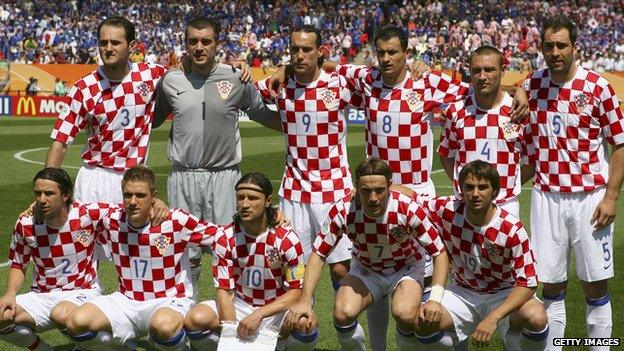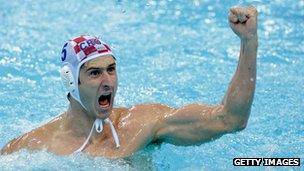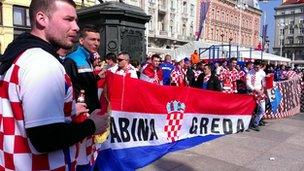What is Croatia's secret to sporting success?
- Published

World beaters? Fifa currently ranks Croatia's national side above five-times World Cup winners Brazil
Everyone seems to have an opinion about sport. Ask three people about their views on a particular team, player or competition and the chances are they will give totally different answers.
But ask a Croatian why their small country excels on the international sporting stage, and the response is surprisingly uniform.
"Croats are just naturally talented," says Igor Stimac, the coach of Croatia's national football team.
Assistant Sports Minister and national basketball legend Petar Skansi believes his country is "a talented sports nation".
Romeo Jozak, head of the Croatian Football Federation technical committee, goes a step further.
"God gave us amazing, talented kids," he says.
It has to be said, the evidence adds up.
High ranking
Fifa promoted Croatia to number four in its most recent world football rankings.
"We were third in 1999," sniffs Igor Stimac.
But the fact is that only World and European champions Spain, the ever-reliable Germany and South American powerhouse Argentina rank above Croatia.
Italy, the Netherlands and France all fall well short, while Brazil languish 19th.
Croatia also excels at basketball, tennis, water polo and handball. At the London Olympics Croatia placed 15th on a medals table weighted by population size.
Punching above its weight? It certainly looks that way. But why?
Physical attributes may play a part. One of the first things that visitors to the Western Balkans notice is how many tall people there are in Croatia and its neighbours Serbia and Montenegro.
Statistics tend to back up that impression.
But there has to be more to it than that.
With a population more than 10 times greater, England can also call on plenty of tall, strong players. Yet they currently rank below Croatia in the Fifa listings.
Raw talent
Meanwhile, despite having key players at the likes of Borussia Dortmund, Manchester City and Chelsea, Serbia have fallen down the rankings and will not make it to the World Cup next year. Curiously, Serbia still excels at tennis - an individual rather than a team sport.
Romeo Jozak, of the Croatian Football Federation, thinks this shows it is no good having the raw material if you do not have a co-ordinated approach.

Croatia also excel at water polo - Marko Jokovic celebrates scoring a goal
He oversees all of Croatian football's age group teams from the under-21s down. He must be doing something right. His players have qualified for the forthcoming under-20 World Cup (as one of only six European nations) and under-17 European Championship, and they are looking in a strong position for other age group tournaments, for which qualification is notoriously difficult.
Such success vindicates a national strategy for player development, emphasising different skills at different ages, that all Croatian clubs have agreed to implement, with technical assistance coming from the football federation.
The result is that players going into the national side have all learned the same way.
"You have to start with a unified vision at the age of 12," says Jozak. "Four years ago we came up with a curriculum, a technical strategy from the under-14s upwards. Every generation must follow that. It's all about being talented, having a vision and clear selection criteria."
Big debut
The sustained nature of Croatia's success is what makes it so striking. Near neighbours in the Balkans have been unable to repeat the successes of the 1990s.
Eye-catching performances for their national teams made the likes of Romania's Gheorghe Hagi and Bulgaria's Hristo Stoichkov household names across Europe.
But since these players retired their sides have struggled even to qualify for the major tournaments.
Croatia is different. It has only missed one European Championship and one World Cup for which it has been eligible.
People connected with Croatian sport believe the country's recent history plays an important role.
It only became independent in 1991, during a conflict which continued until 1995. A year later, the players in the red-and-white checked shirts lit up Euro 96, beating defending champions Denmark en route to the quarter-finals, where they lost to eventual champions Germany.
Their performances were, in many respects, a coming-out party for their country. And the sense of truly representing their nation continues.
"It's a chance to show the world, through the different sports, that we exist," says Igor Stimac, who played at Euro 96 and was in the team that reached the World Cup semi-finals two years later.
"Sportsmen are the best ambassadors for us. It is a great inspiration to represent Croatia. There is a lot of pride. With the war and everything that went on, that increases the national energy.
"We don't have to teach the kids to sing the national anthem. I wouldn't say they're nationalists, but there's national pride, they know they've got to fight."

Croatia fans ahead of the grudge match against Serbia
This spirit can sometimes spill over in the crowd in ugly fashion.
Grudge match
European football's governing body Uefa has warned Croatia about the behaviour of its fans, due to incidents of violence and racism.
In March, while a match against arch-rival Serbia passed off peacefully - though Serbs were banned from attending - chants of "kill a Serb" certainly raised eyebrows among international observers at the stadium in Zagreb.
Nevertheless, maintaining a level of passion may be vital if Croatia is to keep its place among the sporting elite.
In football, Croatia's club sides have been unable to compete with the top sides in Europe. The lack of a competitive national league, and the money that goes with it, means that even great names like Dinamo Zagreb and Hajduk Split have struggled, as the best players head abroad for better pay and the big prizes.
"Team sports require sponsors, powerful patrons, or greater state support, especially at the local level, and that currently places Croatia in an unfavourable position," says Petar Skansi.
"In a world in which money dictates everything, Croatia can compete only at the national teams' level, because at club level it cannot keep pace with exceptional European clubs."
Pool of talent
That means the best Croatian players are scattered across Europe, often leaving while they are still teenagers. In fact, players as young as 16 will be allowed to join foreign clubs after Croatia joins the European Union in July.
Still, Romeo Jozak is unconcerned about the prospect of a talent drain damaging the chances of Croatia's national side. He says the nationwide coaching programme should ensure that young players are imbued with the correct skills and values.
"The major window for making technical implementation is from ages 12 to 16, and they're in Croatia at that time. So when they leave the country it's not a big issue. They already have the core implemented in their bodies."
And competitors be warned: the people at the top of Croatian sport believe EU membership will bring in money to invest in much-needed infrastructure.
"We got this far without infrastructure, just with good coaches and people," says Igor Stimac. "We can expect only progress, results-wise, if we keep up the level and quality of work."